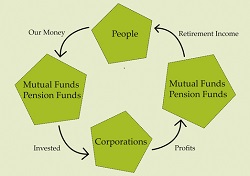|
People, Profits, & Pensions |
|
Gates Foundation & Gap Profits
Monday, April 7, 2014
Altogether, 64.1% of the Gap's shares belong to institutional investors (pension funds, mutual fund, and other investment vehicles), according to nasdaq.com. One of the biggest of the institutional owners is the Bill & Melinda Gates Foundation, which describes itself this way at its website,
To help pay for those initiatives, the Foundation will receive a hefty dividend payment from the Gap corporation in a few days. As of last December 31st, the Foundation owned 10,872,500 Gap shares. Assuming it holds the same number today, it will receive a $2,340,000 when the payments go out, based on quarterly dividend of $0.22. Today is Gap Inc.'s ex-dividend (or ex-div) day. Here's how the U. S. Securities and Exchange Commission defines ex-dividend:
The Bigger Picture:Will Profits from Big Macs Add to Your Retirement Income?In 1948, the McDonald brothers redesigned and remodelled their drive-in restaurant in San Bernardino, California. Taking inspiration from Henry Ford's assembly-line, they created the fast food revolution, with the quick service and low prices we now take for granted. In that same year, the U.S. National Labor Relations Board ruled unions could include pension issues in contract negotiations. That ignited a massive expansion of pension plans. In the 1950s, pension funds started buying stocks, rather than just bonds or their equivalents; in addition mutual funds came of age. With these two developments working, middle class people became owners of big business. At first, their stakes were modest, but steadily growing. And in just a few decades, they gained controlling interests in many large corporations through their funds. Management guru Peter Drucker has called it, "...one of the most startling power shifts in economic history." Now, working people reap the benefits of those investments, collecting much of the profit distributed by McDonald's and other big corporations. Discover how the pieces fit together. In Big Macs & Our Pensions: Who Gets McDonald's Profits? - a new booklet -(about 25-pages), you will:
You may not be among the owners of McDonald's. But if you belong to any pension plan, or contribute to a mutual fund or whole life insurance policy, you likely own pieces of some big corporations. More importantly, though, your retirement income will be bigger and grow more dependably than you would otherwise expect. Big Macs & Our Pensions: Who Gets McDonald's Profits? is now available at Amazon.com |

The Ownership Cycle
Copyright 2014. Robert F. Abbott, All Rights
Reserved.
|

 By Robert F. Abbott, author of
By Robert F. Abbott, author of  Today, we look at ownership of a corporation by a philanthropic organization,
specifically, ownership of a big piece of Gap Inc., the retailing giant which owns not only Gap stores, but
also Old Navy and Banana Republic.
Today, we look at ownership of a corporation by a philanthropic organization,
specifically, ownership of a big piece of Gap Inc., the retailing giant which owns not only Gap stores, but
also Old Navy and Banana Republic.